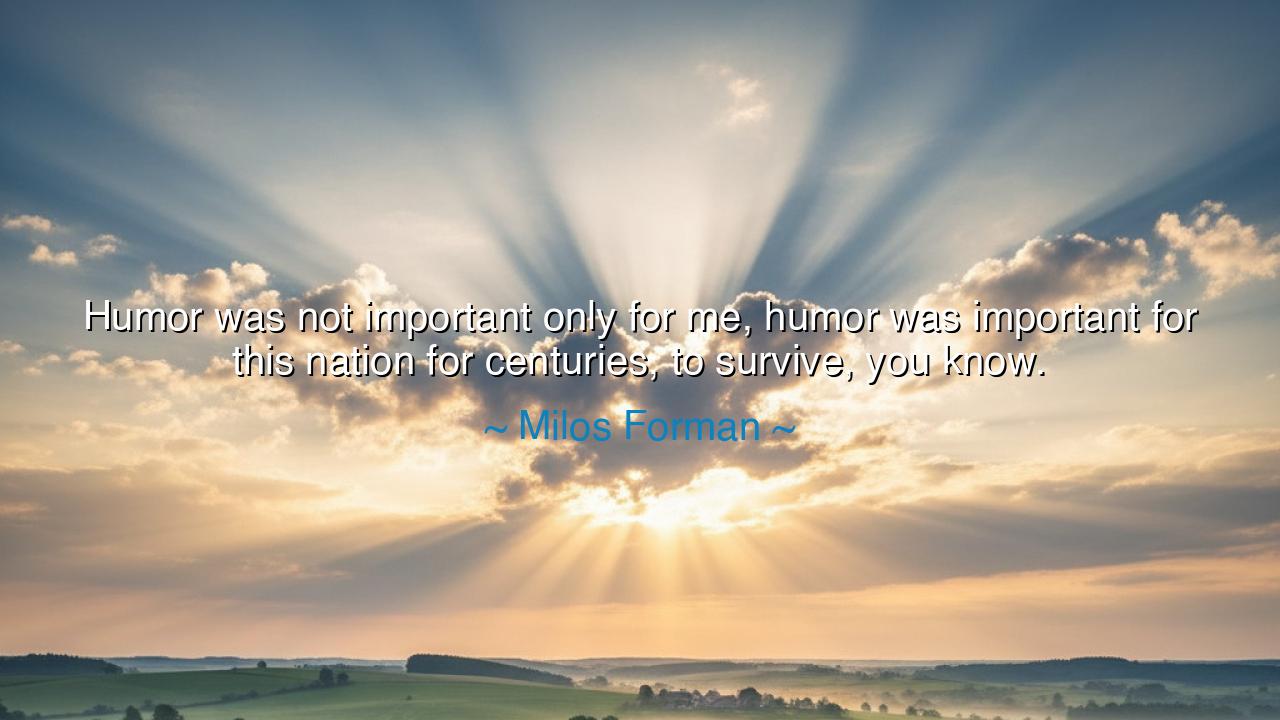
Humor was not important only for me, humor was important for this
Humor was not important only for me, humor was important for this nation for centuries, to survive, you know.






In the profound words of Milos Forman, master storyteller and witness to the shadows of tyranny, we hear not the voice of a comedian, but that of a philosopher of the human spirit: “Humor was not important only for me, humor was important for this nation for centuries, to survive, you know.” These words, though simple, carry the weight of history and the pulse of survival. They speak to the power of humor not as mere amusement, but as a weapon of endurance—a shield of the soul against oppression, despair, and fear. For in the darkest nights of humanity, laughter has been the flame that refuses to die.
Born in Czechoslovakia and raised in a time when freedom was silenced, Milos Forman understood the role of humor as few ever could. Under the suffocating rule of totalitarianism, where every word was monitored and every thought was a risk, the people learned to survive not with arms, but with irony. Their humor became rebellion—a quiet defiance that mocked their rulers while keeping their spirits alive. To laugh, even secretly, was to assert one’s humanity. In this, Forman’s words carry the wisdom of an entire people: that when the body is chained, laughter becomes the breath of the soul.
The origin of this truth lies deep in the traditions of nations that have suffered long. The oppressed have always turned to humor as their last refuge. The ancient slaves of Rome sang songs of irony to mock their masters; the jesters of medieval courts wrapped truth in laughter to survive the wrath of kings; the peasants under empires used jokes as secret prayers for deliverance. And so it was in Forman’s homeland, where under both Nazi and Communist regimes, humor became the language of the unbroken. When speaking freely was dangerous, jokes became the weapon of the powerless, and through laughter, the people told each other: “We still live. We still see the truth.”
Consider the story of the Czech humorist Jaroslav Hašek, whose novel The Good Soldier Švejk turned the absurdity of war into comedy. His hero, Švejk, was a simple soldier who obeyed every foolish order so literally that he exposed the madness of the military itself. Hašek’s satire, written in the shadow of empire, did what no sword could—it revealed the stupidity of tyranny and made the people laugh through their tears. In his laughter lived the same spirit that Forman later captured in his films: the spirit of resilience through humor, the power of the small to outwit the mighty.
When Milos Forman came to America, he carried that spirit within him. In his films—One Flew Over the Cuckoo’s Nest, Amadeus, The Firemen’s Ball—he turned laughter into revelation. He showed that humor could expose hypocrisy, deflate authority, and set the human spirit free. For Forman, humor was never frivolous; it was sacred rebellion. It was the same tool his people had wielded in silence now unleashed upon the world stage—a mirror held to power, forcing it to see its own absurdity. In his hands, humor became truth clothed in laughter.
But Forman’s quote speaks not only to artists or nations—it speaks to all who have faced hardship. He teaches that humor is not the denial of pain, but its transformation. It is the art of turning suffering into strength. When life grows cruel and the world heavy, laughter lightens the burden without denying it. The ancients understood this balance. The Stoics, like Epictetus, who was born a slave, taught that though we cannot control the world, we can control our response to it. Humor is one such response—the choice to remain free within, even when the outer world is unkind.
So let this be the lesson: cherish your laughter, for it is not weakness—it is defiance. When injustice rises, let your humor expose its absurdity. When sorrow strikes, let laughter remind you that your spirit still breathes. Laugh not to escape life, but to embrace it fully, even in its pain. For as Milos Forman and his people knew, laughter can be a torch in darkness, a whisper of liberty when freedom is forbidden, a bridge between despair and hope.
And thus, to all generations, this truth endures: humor is survival. It is the soul’s refusal to surrender, the light that flickers even in the storm. When laughter is shared among the weary, it becomes more than sound—it becomes communion, courage, and rebirth. So guard your humor well, and wield it with compassion and wisdom. For as long as mankind can laugh, no tyranny, no sorrow, and no darkness can ever fully conquer the human heart.






AAdministratorAdministrator
Welcome, honored guests. Please leave a comment, we will respond soon